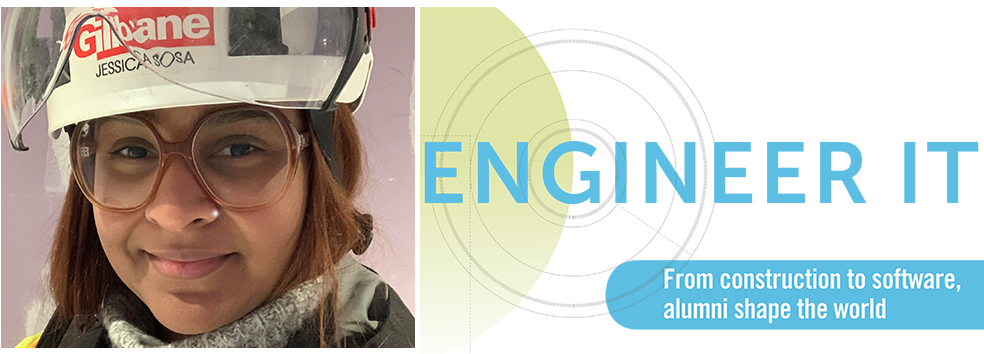Overseeing on-site workers
Jessica Sosa ’10 majored in mechanical engineering and minored in Spanish. She is a superintendent at Gilbane Building Company in New York City. She oversees trade workers specializing in mechanical, electrical/lighting, plumbing, drywall/carpentry, cabinetry, appliances, paint, flooring, stone/tile, glass, hardware and more. It is her responsibility to understand the plans drawn out by the architects and engineers and match them to what is being built on site and what is physically possible.
At Gilbane, Jessica co-leads the Latino Employee Resource Group (ERG) called HOL@ Gilbane. Through HOL@ Gilbane, she helps develop programming in support of diversity and inclusion for employees of Hispanic backgrounds and provides learning opportunities and resources for personal, professional and cultural growth.
She also organizes volunteering efforts at local schools and participates in “Career Day” events for aspiring engineers. On a corporate level, she fosters a culture of ally-ship and anti-racism through webinars and open forums regarding race relations and unconscious bias in the workplace.
She also supports economic inclusion efforts for Minority- and Women-owned Business Enterprise (MWBE) firms in the construction industry. Jessica was president of the Society of Hispanic Professional Engineers (SHPE) Student Chapter while at Union and she continues to work with local student SHPE chapters in the greater NYC area. She volunteers at career development workshops and industry lectures and engages in recruiting efforts for her company. In her free time, Jessica enjoys biking, gardening, traveling and dancing.
What are/were the most challenging aspects of your career? What are/were the most rewarding?
One of the most challenging aspects of my career is general safety while working in the field. On a construction site, everything that seems set is not because it is literally still under construction. You must remain alert all day to ensure that every step you take is safe and free from hazards. This kind of awareness takes a lot of time and energy to develop, especially if you have not worked in a construction site before. It is very different from an office job, where you know that the floor you are walking on will not collapse from under you. Where you know that the guardrails you lean on are completely secure. With time you learn to spot hazards quickly and make decisions to keep yourself and your colleagues safe. The most rewarding aspect of my career is finishing. Reflecting back on a project that used to be a hole in the ground, but is now a massive structure that will outlive your days, is extremely powerful and gratifying.
How has your engineering degree been useful in another field?
My mechanical engineering degree has been extremely useful because I work alongside mechanical systems every day. Understanding how systems work helps me identify issues and isolate them in order to manage the damage they can cause in a project. Of all the theories I learned in college, the most prominent one is Murphy’s Law. The theory that “if something can happen, it will” and usually “at the worst of times.” As engineers, it is up to us to anticipate all the possible outcomes of our decisions so we can appropriately plan for them. The reality is that if we don't, no one else will and it’s important to never lose sight of that responsibility.
What was your most formative experience at Union?
My most formative experience was my mini-term abroad to Egypt with Professor Ashraf Ghaly. We explored the ways that engineering marvels throughout the country impacted civilian life in both ancient and modern ages. As a construction engineer, I’ve learned to consider the ergonomic aspects of a design in order to provide the most useful and functional space with the end-user in mind. This means making sure that undefined or under-defined features are coordinated in the most logical way to support the versatility and efficiency of the space we are building.
What’s the best piece of advice (professional or personal) you ever received?
As I grow in my career, I am learning to take a step back and spend more time thinking about people – the people behind achieving results and the people who will be impacted by them. Construction is a fast-paced, hazardous and downright dirty industry. Every single person that comes into work with you is living under the same unknown conditions and sometimes not under the same big-picture awareness as you. If you let the schedule and the bottom line supersede the health and safety of your team, you don’t get very far with efficiency or production. It takes teamwork to build a building. That doesn’t mean that you just push people to do their job. It means that you listen and care for each and every person, respect their craft and support them to be successful at their job. This “people first” mentality derived from a company motto we have at Gilbane. The more I have found myself applying it at work, the more I am noticing that trust and integrity is developing within my team. Especially now while people are still showing up to work despite undergoing personal affairs related to the COVID-19 pandemic.

